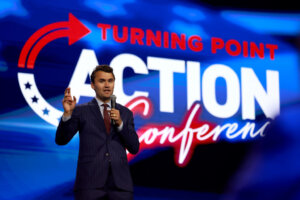In Charlie Kirk, Orthodox Jews found a champion — and a wedge
Kirk faced accusations of antisemitism, while some Jews mourned him like a rebbe

A billboard of Charlie Kirk and President Donald Trump in Tel Aviv. Photo by Jack Guez/AFP via Getty Images
A faux book cover made the rounds recently in Jewish WhatsApp groups — The Life and Legacy of Charlie Kirk, written by Orthodox commentator Ben Shapiro and published by ArtScroll, a company with a series on notable rabbis.
The image was fake but the meme reflected a real irony: In the hours and days following Kirk’s assassination, it seemed like every Orthodox leader and institution in America was treating a devout Christian like a deceased rebbe.

The chief executive of Aish, an Orthodox outreach organization, mourned the loss of “a courageous advocate for our people.” The president of Yeshiva University called Kirk “a personal friend, a friend to our community.” The head spokesperson for Chabad highlighted the Turning Point USA founder’s “steadfast friendship to the Jewish people.” A Chabad rabbi called Kirk “the Abraham of our time.”
To people familiar with Kirk’s rhetoric, these tributes may have seemed strange. Charlie Kirk, steadfast friend? This was a man who blamed Jews for promoting “anti-whiteness.” Courageous advocate for our people? Kirk had said “radical, open border, neoliberal, quasi-Marxist policies” were the fault of Jewish donors.
Yet the glorification of Kirk in the Orthodox community laid bare a simple truth: Even as umbrella Jewish groups like the Anti-Defamation League condemned those comments, many Orthodox Jews were unbothered by them.
“I agree with him,” Rabbi Pesach Wolicki, an Orthodox political commentator who spoke regularly with Kirk, said in a phone interview. “When Charlie said those things on his show, I messaged him right away and I said, ‘Charlie, if you get attacked for being antisemitic, I will write an op-ed.’”
Kirk was divisive not only among American Jews, but about them. His disparagement of minorities — Black people, immigrants, the LGBTQ+ community — was more selective when it came to Jewish people. He played on ancient tropes of Jewish wealth and control, but specifically targeted Jewish liberals. That group makes up three-quarters of American Jewry — but only a fifth of the Orthodox voter base. Meanwhile, Kirk constantly — and for many Jewish people, convincingly — touted his loyalty to Israel and a “biblical values” agenda as Jewish bona fides.
That enabled Jewish conservatives — especially Orthodox Jews, three-quarters of whom supported Trump in 2024 — to see Kirk as a good kind of crusader, even if Jews on the other side of the culture war were collateral damage. Perhaps better than anyone, Kirk underscored the appeal of a “hard weld” of the Jewish and Christian right — and the gaping chasm between that coalition and the American Jewish majority.
Evangelical hasbara
Wolicki is executive director of Israel365, an Orthodox organization that promotes Christian-Jewish political alliance and produces educational programming on Israeli current events. He’s also well-connected in the MAGA movement, and was an occasional guest on The Charlie Kirk Show, a daily livestreamed podcast, appearing remotely from Israel, where he’s based.
Through that relationship, Wolicki eventually became a kind of sounding board for Kirk as he wrestled with questions about the U.S.-Israel relationship. The night before Kirk was shot, he and Wolicki were on Zoom, preparing him to be grilled about Israel on his “American Comeback” college campus tour.
“He used to sometimes say, somewhat cynically — he’s like, ‘I’m doing more hasbara than anyone from Israel,’” Wolicki recalled, using the term for Israel advocacy.
Kirk’s views on Israel have been fiercely contested in the wake of his assassination. Tucker Carlson and Candace Owens, far-right media personalities who criticize U.S. support for Israel, have said Kirk agreed with them despite threats from the Israel lobby, with Secretary of State Marco Rubio, Dennis Prager and others characterizing his support as unflinching.

But Wolicki said the reality was more nuanced.
“He was an evangelical Christian who did believe, theologically, that the modern state of Israel is the long-awaited, biblically foretold return of the nation of Israel to our homeland,” he said. “But at the same time, he didn’t buy the whole package of rah-rah, flag-waving Christian Zionism. He was ‘America First’ to the core.”
That made him a unique figure in a conservative discourse where anti-Israel politics are ascendant: a unifying, charismatic leader who gave an ear — and often a microphone — to the pro-Israel perspective, even if he privately expressed doubts.
“He wanted to hear my argument for why American support for Israel serves America’s interests,” Wolicki said. “That doesn’t mean he bought everything I was selling. He was sometimes critical, sometimes favorable — you know, kind of healthy.”
‘Biblical values’
The Shabbat before Kirk died, Wolicki was a scholar-in-residence at a Modern Orthodox synagogue in Cincinnati. That weekend, he said, a number of Orthodox teenagers came up to him in shul, saying they recognized him from Kirk’s show, which they watched or listened to every day. The same trend was on view when an Orthodox streetwear brand started selling yarmulkes with Kirk’s face on it.
Wolicki did not think those teens were primarily drawn to Kirk over Israel. The bigger pull, he said, were Kirk’s “biblical values,” a slew of conservative social positions, rooted in religious ideology and aesthetics, where Christian and Orthodox conservatives align.
Not all of Kirk’s politics — anti-LGBTQ+, anti-woke, anti-abortion, anti-DEI — map neatly onto halacha, or Jewish law. (And there are other biblical values that he would seem to have violated personally; demeaning speech, for example, is prohibited.) But as Orthodox Jews have allied with the Christian right, there has been a values exchange. Orthodox Jewish organizations are now participants in the weakening of the separation of church and state, which liberal Jews tend to see as the bedrock of Jewish success and security in this country.
Most Orthodox Jews categorize Christianity’s belief in a Holy Trinity as polytheistic, and for that reason won’t step foot in a church because it is forbidden. Yet Kirk’s Christianity was central to his appeal, in part because he made Jewish practice a part of it. He wrote a forthcoming book about the value of “the Jewish Sabbath” — from a conservative publishing house, not ArtScroll — which he said he observed by turning off his phone and logging out of social media. And he once implored Jewish students to observe Shabbat themselves.
“In an era where so many of the Jewish legacy organizations abandoned core principles, it was badly needed and refreshing to have someone like Charlie bat for us,” Shabbos Kestenbaum, a contributor to PragerU, a conservative media outlet, said in a message. “Charlie encouraged Americans to invest in their spiritual health and religious identity. There are more Americans going to church or synagogue services because of Charlie. How can that not be applauded?”
Religion scholars say the notion of “Judeo-Christian values” — which Kirk often said were foundational to the United States — are a right-wing myth whose real purpose is to subsume Judaism into Christianity and exclude Islam.
But Eli Steinberg, a Haredi Orthodox commentator, wasn’t suspicious of Kirk’s motives.
“We’re not at the point in time right now where the Christian allies of Jewish people are seeking to convert Jews to Christianity,” Steinberg said. “What we do have is an overwhelming force of secularists who have, in place of religion, woke politics.”
Kirk carried the torch for ideas that the liberal consensus holds are outdated: that marriage is between a man and a woman; that a woman must submit to her husband; that gender is defined at birth; and that belief in God is the source of morality.
Steinberg admitted the alliance between Christians and Jews was imperfect. But Kirk was the enemy of his enemy — that is, liberals, including Jewish ones, who he believed were waging a war on religion through a “woke” agenda.
“You see the other side, and it’s like, ‘Wait, these people are standing up for me,’” Steinberg said. “So there’s kind of, like, this inverse relationship.”

Antisemitism — for thee but not for me?
Kirk’s statements about Black people (famously saying Michelle Obama and Supreme Court Justice Ketanji Brown Jackson “do not have the brain processing power to otherwise be taken really seriously”), immigrants (touting the Great Replacement Theory), and transgender people (whom he regularly slurred) may have been more clearly offensive than his comments about Jewish people. And some of that ideology may have purchase in Orthodox spaces, which are insular and patriarchal by nature.
But if trafficking in antisemitic tropes leads to antisemitic violence, as organizations like the ADL — which said Kirk “created a vast platform for extremists and far-right conspiracy theorists” — often assert, then Orthodox Jews have a disproportionate likelihood of being the victims. Right-wing antisemitism remains a greater cause of violence than left-wing antisemitism; the mass shooter at Chabad of Poway in 2019 hated both Muslims and Jews.
Steinberg acknowledged he could have “done without” some of the things Kirk said about Jewish people.
“Of course I would rather it not be talked about in that way,” Steinberg said. “But I also understand that someone who’s not Jewish, seeing Jewish people engaging in behavior that’s destructive — what right do I have to say that they’re not allowed to point it out?”
Yet what Kirk may have exposed most vividly was not the political divergence of Orthodox and non-Orthodox Jews, but an actual contempt one group has for the other. In playing up Sabbath observance and attacking Jewish liberals, Kirk was both championing Orthodox belief as authentic Judaism and giving voice to Orthodox resentments toward other Jews.
For more than a century, the American Jewish consensus has been a deeply liberal one, reflected in mainstream institutions as well as cultural depictions. Orthodox Jews have never controlled the narrative of Jewish identity because they represent just a tenth of American Jews. The position of Kirk was effectively that the Jewish majority doesn’t deserve to speak for Jews — that the Jewish majority was actually the problem all along.

















